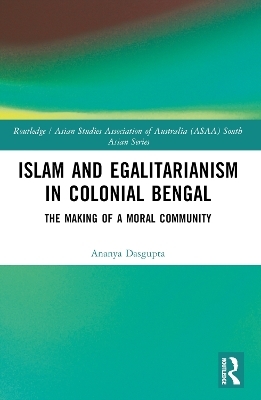
Islam and Egalitarianism in Colonial Bengal
The Making of a Moral Community
Seiten
2024
Routledge (Verlag)
978-1-032-36413-1 (ISBN)
Routledge (Verlag)
978-1-032-36413-1 (ISBN)
This book is a historical exploration of the social and cultural processes that led to the rise of the ideology of labor as a touchstone of Bengali Muslim politics in late colonial India. It will be of interest to SA history, colonialism and end of empire, labour studies, Islamic Studies & Muslim social and cultural history.
This book is a historical exploration of the social and cultural processes that led to the rise of the ideology of labor as a touchstone of Bengali Muslim politics in late colonial India.
The book argues that the tremendous popularity of the Pakistan movement in Bengal is to be understood not just in terms of "communalization" of class politics, or even "separatist" demands of a religious minority living out anxieties of Hindu political majoritarianism, but in terms of a distinctively modern idea of Muslim self and culture which gave primacy to production/labor as the site where religious, moral, ethical, as well as economic value would be anchored. In telling the story of the formation of a modern Muslim identity, the book presents the conceptual congruence between Islam and egalitarianism as a distinctively early twentieth-century phenomenon, and the approach can be viewed as key to explaining the mass appeal of the desire for Pakistan.
A novel contribution to the study of Bengal and Pakistan’s origins, the book will be of interest to researchers studying South Asian history, the history of colonialism and end of empire, South Asian studies, including labor studies, Islamic Studies, and Muslim social and cultural history.
This book is a historical exploration of the social and cultural processes that led to the rise of the ideology of labor as a touchstone of Bengali Muslim politics in late colonial India.
The book argues that the tremendous popularity of the Pakistan movement in Bengal is to be understood not just in terms of "communalization" of class politics, or even "separatist" demands of a religious minority living out anxieties of Hindu political majoritarianism, but in terms of a distinctively modern idea of Muslim self and culture which gave primacy to production/labor as the site where religious, moral, ethical, as well as economic value would be anchored. In telling the story of the formation of a modern Muslim identity, the book presents the conceptual congruence between Islam and egalitarianism as a distinctively early twentieth-century phenomenon, and the approach can be viewed as key to explaining the mass appeal of the desire for Pakistan.
A novel contribution to the study of Bengal and Pakistan’s origins, the book will be of interest to researchers studying South Asian history, the history of colonialism and end of empire, South Asian studies, including labor studies, Islamic Studies, and Muslim social and cultural history.
Ananya Dasgupta is Assistant Professor in the Department of History, Case Western Reserve University, USA.
Chapter 1: Introduction; Chapter 2: The Muslim’s Burden: Riba and the Value of Labor; Chapter 3: The Making of Democratic Islam: Changing Ideas of Muslim Political Representation; Chapter 4: From Respect to Redistribution: The Hegemony of Praja Identity; Chapter 5: Imagining Pakistan: Islam, the Individual, and Egalitarianism in Bengali Muslim Literary Praxis; Conclusion
| Erscheinungsdatum | 16.03.2023 |
|---|---|
| Reihe/Serie | Routledge/Asian Studies Association of Australia ASAA South Asian Series |
| Verlagsort | London |
| Sprache | englisch |
| Maße | 156 x 234 mm |
| Gewicht | 258 g |
| Themenwelt | Geisteswissenschaften ► Religion / Theologie ► Islam |
| Sozialwissenschaften ► Ethnologie | |
| Sozialwissenschaften ► Soziologie ► Spezielle Soziologien | |
| ISBN-10 | 1-032-36413-0 / 1032364130 |
| ISBN-13 | 978-1-032-36413-1 / 9781032364131 |
| Zustand | Neuware |
| Haben Sie eine Frage zum Produkt? |
Mehr entdecken
aus dem Bereich
aus dem Bereich


